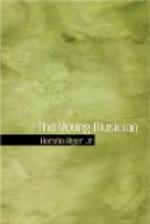Philip was determined to do his best. Indeed, after being advertised and announced as a boy wonder, he felt that he could not do otherwise.
He commenced, and soon lost himself in the music he loved so well, so that before he had half finished he had quite forgotten his audience, and half started at the boisterous applause which followed. He bowed his acknowledgments, but found this would not do.
He was forced to play it a second time, greatly to the apparent satisfaction of the audience. It was clear that, whatever might be thought of Professor Riccabocea’s recitation, the young violinist had not disappointed his audience.
Philip could see, in a seat near the stage, the beaming face of his friend Morris Lovett, who was delighted at the success of his old acquaintance, and anticipated the reflected glory which he received, from its being known that he was a friend of the wonderful young musician.
Professor Riccabocca came forward again, and recited a poem called “The Maniac,” each stanza ending with the line: “I am not mad, but soon shall be.”
He stamped, raved, tore his hair, and made altogether a very grotesque appearance.
Philip could hardly forbear laughing, and some of the boys in the front seats didn’t restrain themselves, Some of the older people wondered how such a man should be selected by the Prince of Wales to instruct his sons in elocution—not suspecting that the newspaper paragraph making mention of this was only a daring invention of the eminent professor.
Next came another musical selection by Philip, which was as cordially received as the first.
I do not propose to weary the reader by a recital of the program and a detailed account of each performance. It is enough to say that Professor Riccabocca excited some amusement, but was only tolerated for the sake of Philip’s playing.
Naturally, our hero was better received on account of his youth, but had he been twice as old his playing would have given satisfaction and pleasure.
So passed an hour and a half, and the musical entertainment was over. Philip felt that he had reason to be satisfied. Highly as he had been heralded, no one appeared to feel disappointed by his part of the performance.
“Mr. de Gray,” said the professor, when they reached the hotel, “you did splendidly. We have made a complete success.”
“It is very gratifying,” said Philip.
“I felt sure that the public would appreciate us. I think I managed everything shrewdly.”
“How much was paid in at the door?” asked Philip, who naturally felt interested in this phase of success.
“One hundred and forty-five dollars and a half!” answered the professor.
Philip’s eyes sparkled.
“And how much will that be over and above expenses?” he asked.
“My dear Mr. de Gray, we will settle all bills, and make a fair and equitable division, in the morning. I think there will be a little more than fifty dollars to come to each of us.”




